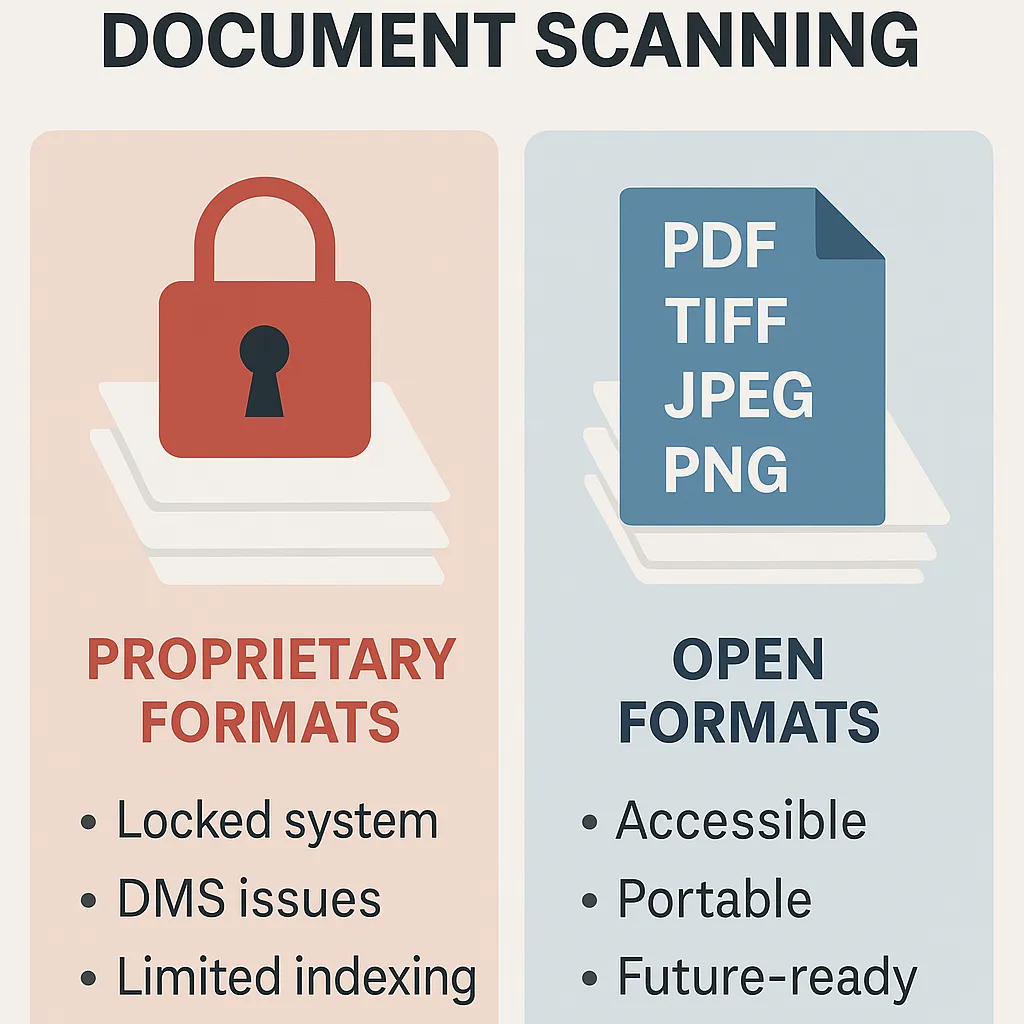
Why Open File Formats Matter in Document Scanning
By: USA IMAGING, Inc.
When it comes to digitizing records, the format you choose determines how accessible and useful your files will be in the future. At USA IMAGING, Inc., we avoid locking clients into proprietary formats that only work with specific software. Instead, we provide files in open, non-proprietary formats such as PDF, TIFF, JPEG, or PNG—formats that stand the test of time.
What Are Proprietary Formats?
A proprietary format is one that requires a specific company’s software to view or manage. This can create serious challenges if the software becomes outdated, discontinued, or incompatible with new systems. Imagine scanning thousands of documents only to find out years later that you can’t open them—or that they’re tied to one vendor’s document management system.
The Problems with Proprietary Formats
Vendor Lock-In: You’re tied to one provider’s software and systems.
Risk of Obsolescence: If the software is discontinued, your files may be trapped.
Added Costs: Often requires ongoing licensing or support fees just to keep accessing your records.
DMS Limitations: Proprietary files may only function inside a specific document management system, preventing you from migrating to a new platform without costly conversions.
Indexing Restrictions: With closed formats, indexing fields (like client name, invoice number, or date) may be locked into the software’s database rather than embedded in the file itself, making long-term retrieval and portability more difficult.
The Role of Indexing in Digital File Management

Scanning documents is only half the story—being able to find them quickly is where the true value lies. Indexing is the process of assigning searchable names or tags to your files so they’re easy to locate, just like flipping through a filing cabinet.
The simplest approach is to mirror your existing system. If your hard copies are stored alphabetically by client name, the digital files can follow the same naming convention. This one-to-one method makes the transition from paper to digital nearly seamless.
But digital formats, particularly PDFs, open the door to more powerful options:
Metadata & Document Properties: Beyond a file name, PDFs allow metadata (document information such as author, client name, date, or case number) to be embedded directly into the file. These fields become searchable, even if you don’t remember the exact file name.
Bookmarks & Table of Contents: If you’re scanning binders or multi-section files, bookmarks provide a digital equivalent to divider tabs—allowing instant access to specific sections.
Security & Access Controls: Indexing can be paired with password protection and user permissions, ensuring sensitive information is only accessible to the right people.
The best part? Indexing doesn’t have to be final at the moment of scanning. Even if you begin with a simple naming structure, additional layers of indexing, metadata, or bookmarks can be added later to refine how files are retrieved and used. Think of it as starting with a basic electronic cabinet, then customizing it into the “perfect” digital filing system tailored to your workflow.
Why We Use Non-Proprietary Formats
Universal Access: Standard formats like PDF and TIFF can be opened on virtually any computer, without special software.
Future-Proofing: Open formats have been in use for decades and remain widely supported across industries.
Flexible Indexing: Indexing data can be exported alongside the files in CSV, XML, or TXT formats, so you can import it into any document management system without losing searchability.
Integration-Friendly: Non-proprietary files work easily with your existing systems—whether that’s a DMS, cloud storage, or simple file folders.
Client Control: You’re not dependent on USA IMAGING, Inc. or any other company for access to your digital files.
Our Commitment to You
Your records belong to you—not to a piece of software. That’s why every project we deliver ensures you get full, direct access to your files in formats that are open, secure, and widely compatible. With flexible indexing options and freedom from vendor lock-in, you remain in control of your information.
CALL US TODAY: 858-513-6565 or email: [email protected]
